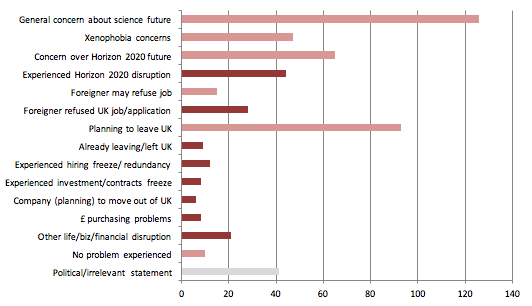
 The government’s promise to underwrite Horizon 2020 funding was a bare minimum and uncertainty about future funding has made the UK a much less attractive place for research, write Mike Galsworthy and Rob Davidson. They present an eight-point plan to limit damage to UK science and put its knowledge economy back in contention.
The government’s promise to underwrite Horizon 2020 funding was a bare minimum and uncertainty about future funding has made the UK a much less attractive place for research, write Mike Galsworthy and Rob Davidson. They present an eight-point plan to limit damage to UK science and put its knowledge economy back in contention.
Brexit has already punctured a hole in the hull of the UK’s world-leading science and innovation sector. While almost daily we hear that investors and the financial market are suffering from uncertainty and must have confidence restored, UK science has been much more rapidly affected by the vote. Yet this key part of our future economy is receiving far fewer reassurances from government.
Politicians have been talking increasingly about this country becoming a ‘knowledge economy’; a nation of researchers, engineers and designers who can tap into the cheap prototyping and mass production in developing markets, weaving their innovation into prosperity. In fact, according to the US National Academy of Sciences and others, over half of America’s economic growth since the second world war can be attributed to science and technology. Yet, in the 21st century, science is highly sensitive to uncertainty in its international ecosystem around it. A chaotic Brexit looks set to heavily disrupt the UK’s knowledge sector.
This need not be the case, but UK science and tech are already haemorrhaging talent and collaborations. Our government appears reticent about declaring the much-needed robust support for the sector prior to Article 50 negotiations. One week after the referendum result, we at Scientists for EU sent out a call for researchers to record their experiences of the immediate impact from the vote. This process is ongoing and readers can participate via the web form “Monitoring Brexit impact on UK science” on the SfEU website.
To date, we have received 438 submissions. The vast majority of those came in weeks 1-4, when we were collecting intensively. After that, we focused on analysis and dissemination. As you can see in the figure, mixed in with categories of concern were (in dark red) many cases already of impact already felt. We note that the broad findings here are supported by media reports and other early polls, such one on dementia researchers and another commissioned by Pfizer.

The UK is already a less attractive place to do science
Our reading of those hundreds of entries, many confidential, suggested to us that the UK has overnight become less attractive as a place to do science. The first reason is cultural and the second is funding-related. The surge in xenophobia nationally has made many foreigners in the UK science base feel less welcome and uncertain about their future rights. Many scientists are upset with the nation’s vote per se and feel unsettled by the country’s direction.
The uncertainty of the funding landscape ahead is a strong factor in the UK’s decreased attractiveness to researchers here and prospective migrants. These concerns comprise potential economic recession, low national funding for science and re-shuffle of UK science structure and policy. However, the largest component appeared to be the unknown future relationship with the EU science programme and with it the ability to draw talent, a full range of research options and leadership opportunities.
Our data indicates that the UK is not in as robust a position as is often imagined. Issues such as low wages, job insecurity, high visa fees (especially for family members), austerity and a history of low R&D funding re-emerge easily when the advantage of EU membership is removed. The scientists we wish to attract are also highly mobile, globally. A reduced attractiveness will not only decrease our regular job applications and student applications, but also hit the talent we so regularly draw via the highly-competitive EU grant systems for exceptional individuals, such as the European Research Council (ERC) grants and Marie-Curie grants.
We anticipate the loss of talent we once took for granted will continue up until the actual point of Brexit or when key parameters about funding or EU citizen rights are known.
The impact on collaborations
Since the vote, the Science Minister Jo Johnson, EU Science Commissioner Carlos Moedas and Chancellor Philip Hammond have all made assurances about the continuity of UK scientists of the EU €80bn science programme, Horizon 2020, which runs from 2014-2020. However, Johnson and Moedas have little impact on the UK’s Brexit negotiation strategy and Hammond’s promise to underwrite H2020 funding was a bare minimum. It reassures EU partners putting in projects with UK collaborators right now that the plug would not be pulled on any projects continuing through Brexit. However, this guarantee to honour contracts will have little meaning to scientists planning large-scale collaborations and research consortia many years in advance. There was no promise to match, on a national level, any EU funds lost in the longer run.
The competitive nature of EU funding means that groups of researchers will often spend up to two years preparing and submitting a bid and will often expect to have to amend and resubmit at some later stage. It is also common to apply for starter funding with the hopes of applying for ‘follow on’ funding if the initial foray goes well. These are long-term collaborations that require certainty well beyond H2020. When Switzerland had negotiation problems with Horizon 2020, they saw their project participation rate drop by 40% and coordination rate drop by over 95%. We would not be surprised to see drops in applications from the UK now – but hopefully not near those levels.
Complex troubles ahead
There has been a lack of long-term assurance for UK science. This causes concern which is further exacerbated by Theresa May’s statements about restrictions on migration being her ‘red line’. Such positions look set to make ‘hard Brexit’ or complete separation from the Single Market more likely, a position that is popular with Brexit leaders on the negotiating team (David Davis, Liam Fox and recently even Philip Hammond have been linked with this strategy). Such a course would not only damage UK access to EU science collaboration and talent, but would also likely have negative impact on tax revenue used to publicly fund science and education. Restricted access to the Single Market and EU talent also poses problems for tech startups in the UK. Anyone who believes that the EU will allow the UK full participation in the science programme without a freedom of movement agreement is woefully naïve.
For the remaining member states, the thought of undermining their own fundamental principles to prop up UK science dominance at their own financial expense does not appeal. Rather, many will see the opportunity to pick up the coordination roles, talent and commercialisation opportunities for their own researchers and institutes – plucking them from an arrogant underfunded country that has just lost its automatic entitlements.
During the referendum debate, many Brexit advocates stated that international collaboration does not require the broader political union of the EU. Yet the EU’s remarkable recent science success and political integration are inherently, inextricably linked. Threats to UK science are not limited to a possible impasse over freedom of movement and full access to the EU science programme, but extend also to issues of shared regulations, intellectual property, commercialisation of research, shared policy, shared infrastructure, customs barriers, and EU citizen rights on student fees, insurance, pensions, etc. These will be a complex headache to sort out and many individuals and businesses will feel forced to choose between the UK and EU for their futures.
A plan
To navigate through the complexity, it’s best to identify the key issues to tackle. Here we present an 8-point action plan for limiting damage to UK science and putting the UK’s knowledge economy back on the front foot.
- Increase national funding. The UK is already at the bottom of the G8 and must increase R&D funding from 1.7% to at least the 3% of GDP that has become an international standard. We must also make assurances about compensating for any long-term losses to EU science.
- Protect and promote science immigration. We must make assurances to science professionals and their families that coming to and remaining in the UK will not be restricted post-Brexit. We must also protect access to migration kickstarters like Erasmus+.
- Commit to harmonised standards and regulations. UK-based business and research must be assured that they will not be faced with regulation-drift for several years post-Brexit. Any ‘reforms’ sought by the UK ought to be conducted with input from EU members, positioning the UK as a European regulation test-bed rather than in aggressive competition with our neighbours.
- Commit to the Unitary Patent and Unified Patent Court. These two developments are almost complete and will facilitate intellectual property rights and business development across the region. The UK can ratify the agreement now and it should only require a small change to grant accession post-Brexit.
- Make a solid case as to why we should retain access to EU science programmes. This will be hard while Theresa May holds restricted immigration as her ‘red line’ in negotiations. The UK must demonstrate how its participation in EU science can be a benefit to the holistic partnership of the EU. We get more out of EU science than we put in but we currently make up for it with contributions elsewhere. We should be prepared to invest.
- Plan how to impact regional and global science policy. We have had a strong voice in the EU, the world’s most productive science hub and richest market. This amplified our impact on the global stage. We must seek a relationship where our national science institutions can feed into broad European science policy. We should fund and facilitate the many European Research Infrastructures and discover new avenues for soft-power in science policy, globally. The new overarching national body, UK Research and Innovation (UKRI), should lead the development of this strategy.
- Compensate for EU investment in small innovative businesses. The EU has been boosting UK innovative startups to the tune of billions annually through Horizon 2020, the Regional Development Fund, the European Social Fund, European Fund for Strategic Investment, European Investment Bank and European Investment Fund. Many of these have aimed to leverage private investment into large infrastructure projects and small tech and innovation-based businesses. We must map this funding ecosystem and plan to replace the money and the administration of these investment streams.
- Monitor the UK knowledge economy. We need a consortium of agencies to monitor impact across the science sector from student intake to tech startup. That means keeping an eye on grant rates, talent inflow, cash inflow, businesses relocating, etc. Major changes will be obvious but combinatorial effects across the multi-faceted knowledge base will need close scrutiny. The closer to ‘real-time’ the better.
We conclude that action needs to take the form of: Commit, Plan, Monitor. In all of the above, the mid-term aim should be to ensure the maximum continuity possible – committing to continuation and certainty. This needs to be complemented by a funding increase to UK science to counteract the fallout and put the UK in a stronger, more flexible, negotiating position – early commitment of funds is necessary to shore up confidence. Monitoring and planning actions must be taken as a cycle, similar to the ‘observe, hypothesise, observe again’ pattern of the scientific method. Mitigating Brexit is nothing less than an experiment that currently includes too many unknown variables. Commitments should be made but our nation also must be prepared to change plans with shifting circumstances.
____
This post was originally published on the Brexit blog.
 Mike Galsworthy is co-founder of Scientists for EU. He is an independent consultant in research and innovation policy and a visiting researcher at London School of Hygiene & Tropical Medicine. Follow SfEU on Twitter (@Scientists4EU) or Facebook.
Mike Galsworthy is co-founder of Scientists for EU. He is an independent consultant in research and innovation policy and a visiting researcher at London School of Hygiene & Tropical Medicine. Follow SfEU on Twitter (@Scientists4EU) or Facebook.
 Rob Davidson is co-founder of Scientists for EU. He works as a Data Scientist for the academic online journal Gigascience. Previously he worked as post-doctoral bioinformatician at the University of Birmingham.
Rob Davidson is co-founder of Scientists for EU. He works as a Data Scientist for the academic online journal Gigascience. Previously he worked as post-doctoral bioinformatician at the University of Birmingham.
Further details about Figure 1
The numbers and impacts
- 28 A foreign national refused a UK job/ pulled an application or an advertised job received a surprisingly low number of EU applicants.
- 9 Someone in UK science actually leaving/left already (where Brexit was a factor in that decision. Note that these people usually had an offer on the table at the time of the vote)
- 40 Horizon 2020 disruption (usually UK partner stepped off project application or down from coordinator role, often at request of EU partners. Some of these cases resolved amicably)
- 55 Life/business/financial disruptions—including £ purchasing problems, businesses moving, investors holding back money, hiring freezes, redundancies, planned work frozen due to work becoming questionable in light of Brexit (eg EU regulation-based), personal financial disruptions (e.g. cancel house purchase)
Statements of concern/intention
- 47 Citing xenophobia as an issue/concern (including several personal experiences of abuse)
- 93 Planning to leave (either respondent or people they know)
- 15 Foreigner may refuse job (concern – not happened yet/ in discussion)
- 65 Concern over UK future relationship with Horizon 2020
- 126 Other concerns about UK science’s future or their own career future (eg. status of EU migrants, UK funding levels/plans, regulatory frameworks, other EU funding streams, reports on lowered mood of lab, concerns over anti-expert rhetoric…)
Miscellaneous
- 10 Statements saying there is no problem/ their European partners are supportive
- 41 Political/irrelevant statement (so ignore. Total N of relevant responses then is 438-41=397)








Despite brexit, there will be a great collaboration among EU countries in science and technology.
Muhammad Naeem ul Fateh
The UK should invent their own funds instead of the EU one.